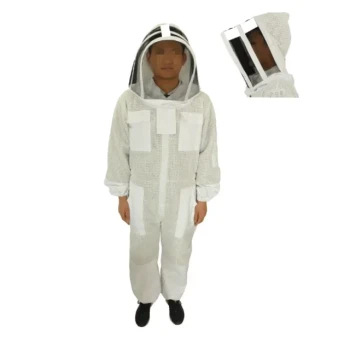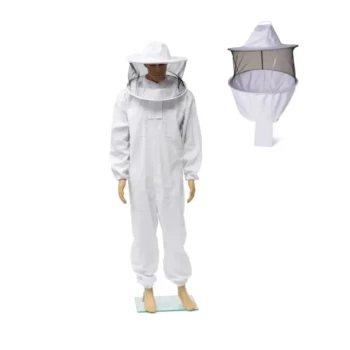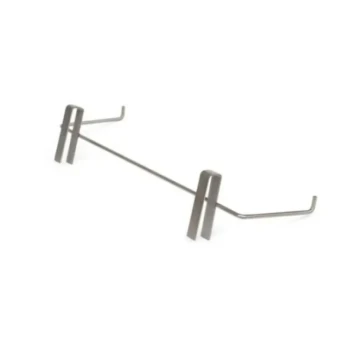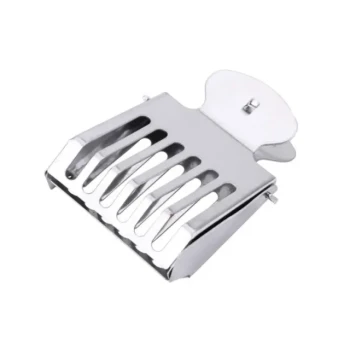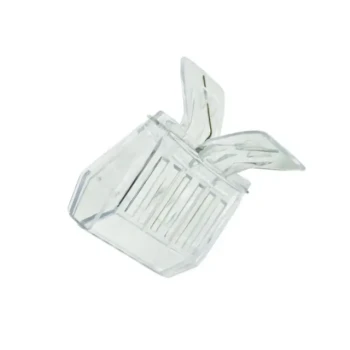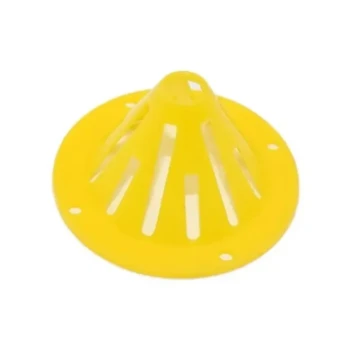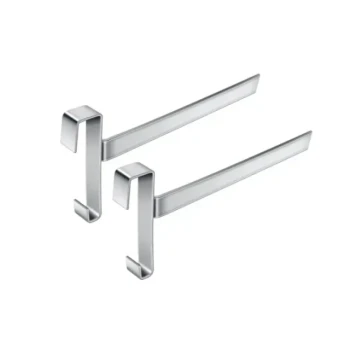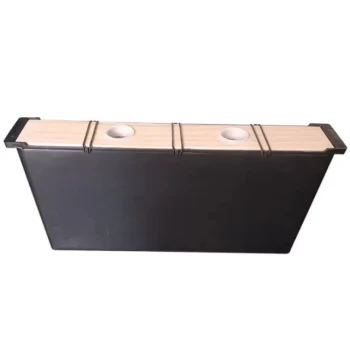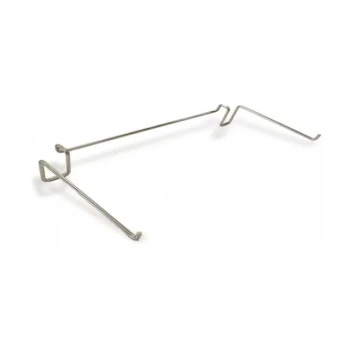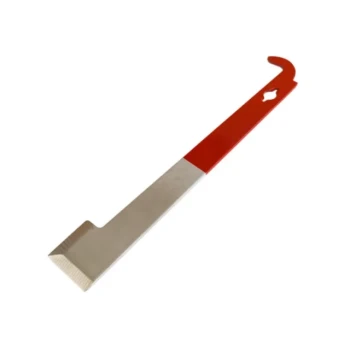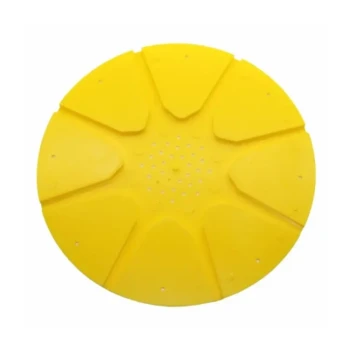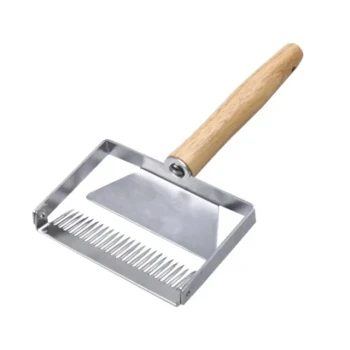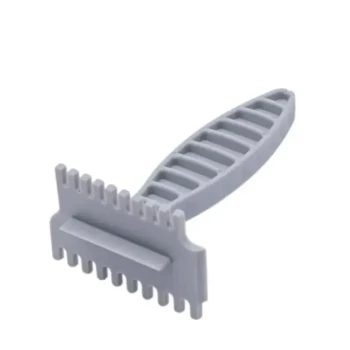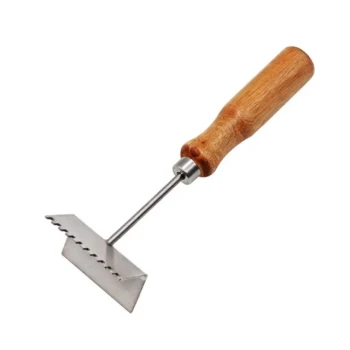Regularly cleaning your beekeeping gloves is a critical discipline for three core reasons: it protects your bees from disease, ensures your personal safety by maintaining the glove's protective qualities, and prolongs the life of your essential equipment. This simple act of maintenance prevents the transfer of pathogens between hives and ensures you can handle your bees with dexterity and confidence.
The core issue isn't just about removing dirt; it's about risk management. Clean gloves are a cornerstone of apiary biosecurity, directly impacting hive health, your own safety, and the long-term value of your gear.
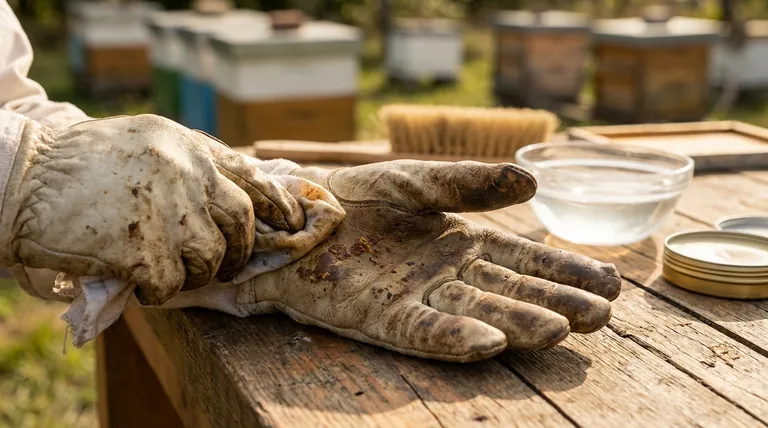
The Role of Glove Hygiene in Hive Health
One of the most significant, yet often overlooked, reasons for cleaning gloves is to protect your bees. Your gloves are a primary vector for transferring contaminants from one hive to another.
Preventing the Spread of Pathogens
Your gloves can easily pick up spores, bacteria, and viruses from one colony. Without cleaning, you risk introducing devastating diseases like American Foulbrood to healthy hives or entire apiaries.
Avoiding Cross-Contamination
Even in your own bee yard, moving from a weaker or potentially sick hive to a stronger one without cleaning your gear can spread problems rapidly, undermining the health of your entire operation.
How Clean Gloves Enhance Your Safety and Control
Dirty gloves don't just threaten your bees; they compromise your effectiveness and safety as a beekeeper.
Maintaining Dexterity and Grip
Gloves caked in honey, wax, and propolis become stiff and sticky. This significantly reduces your ability to handle delicate frames and equipment, leading to clumsy movements that can agitate a colony.
Ensuring Protective Integrity
Regular cleaning and conditioning of leather gloves prevent the material from drying out, becoming brittle, and cracking. A crack in your glove is a direct entry point for a defensive sting.
Maximizing Your Comfort
Clean, supple gloves are simply more comfortable to wear and use. This reduces frustration during hive inspections, allowing you to remain calmer and more focused, which in turn keeps the bees calmer.
Understanding the Practical Realities
While essential, it's important to approach glove cleaning with realistic expectations and the correct techniques.
They Will Never Be 'Like New'
Beekeeping gloves are tools, not formalwear. The goal is to make them hygienic and functional, not to restore their original pristine appearance. Stains from propolis are notoriously difficult to remove completely.
The Risk of Improper Cleaning
You must clean gloves based on their material. Soaking leather gloves in water will ruin them by causing them to become stiff and brittle once they dry. The wrong technique can do more harm than good.
The Time Commitment
Proper cleaning isn't instantaneous. It requires a small investment of time to brush, wipe, dry, and condition the gloves, but this effort pays significant dividends in safety and equipment longevity.
A Practical Method for Cleaning Leather Gloves
For standard cow or goat leather gloves, a gentle approach is required to maintain their suppleness and protective qualities.
Step 1: Remove Surface Debris
Start by using a soft brush to remove any loose dirt, dried honey, or propolis from the surface of the gloves.
Step 2: Prepare a Gentle Solution
Mix a small amount of mild soap or a dedicated leather cleaner into a bowl of warm water.
Step 3: Wipe, Don't Soak
Dip a soft cloth into the solution, wring it out so it is damp but not dripping, and gently wipe down the entire surface of the gloves. Avoid saturating the leather.
Step 4: Air Dry Correctly
Wipe off any excess moisture with a clean, dry towel. Allow the gloves to air dry naturally, away from direct heat or sunlight, which can cause the leather to shrink and crack.
Step 5: Condition the Leather
Once the gloves are completely dry, apply a quality leather conditioner. This crucial step restores oils to the leather, keeping it soft, flexible, and water-resistant.
Making the Right Choice for Your Practice
Your approach to glove care should align with your primary goals as a beekeeper.
- If your primary focus is hive health: Make cleaning your gloves between apiary visits and after inspecting any suspect hive your top priority to prevent disease transmission.
- If your primary focus is personal safety: Regularly clean and condition your gloves to maintain flexibility and ensure the leather remains a reliable, uncompromised barrier against stings.
- If your primary focus is long-term value: View proper cleaning not as a chore, but as essential maintenance that protects your investment and ensures your gear will serve you well for many seasons.
Consistent glove care is a simple discipline that reflects a deep respect for your bees and your craft.
Summary Table:
| Reason for Cleaning | Key Benefit |
|---|---|
| Hive Health | Prevents spread of pathogens like American Foulbrood between colonies. |
| Beekeeper Safety | Maintains dexterity, grip, and protective integrity against stings. |
| Equipment Longevity | Prolongs the life of your leather gloves, protecting your investment. |
Protect your apiary investment with the right gear. Proper glove maintenance is just one part of a successful beekeeping operation. HONESTBEE supplies commercial apiaries and beekeeping equipment distributors with durable, high-quality beekeeping supplies and equipment through our wholesale-focused operations. Ensure your entire operation is equipped for safety and efficiency.
Contact HONESTBEE today to discuss your wholesale supply needs and keep your business thriving.
Visual Guide

Related Products
- Vented Beekeeping Jacket with Hood and Veil for Beekeepers
- Three-Layer Ventilated Beekeeper Suit with Structured Fencing Veil
- Professional Cotton Beekeeper Suit with Round Veil Design for Commercial Apiaries
- Yellow Plastic Bucket Pail Perch for Beekeeping
- Long Langstroth Style Horizontal Top Bar Hive for Wholesale
People Also Ask
- How do dirty leather beekeeping gloves impact honeybee behavior? Prevent Aggression with Clean Gear
- What factors should be considered when choosing the most sting-resistant beekeeping gloves? Balance Protection & Dexterity
- What are the key factors to consider when selecting gloves for beekeeping? Balance Protection and Dexterity
- What type of beekeeping gloves are recommended for individuals with bee venom allergies? Prioritize Sting-Proof Safety
- How should beekeeping gloves be cleaned? Protect Your Investment with Proper Care
- How should leather beekeeping gloves be dried and conditioned? Expert Tips for Lasting Protection
- Which cleaning solutions are most effective for beekeeping gloves? Keep Canvas and Mesh Gear in Top Condition
- How can you test the fit of beekeeping gloves before purchasing? Ensure Dexterity and Protection

